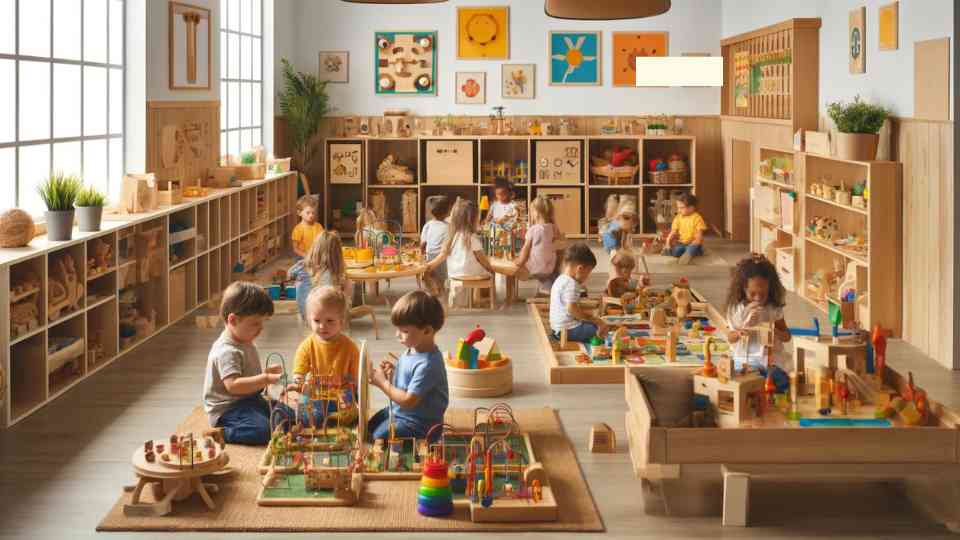Best Montessori Toys for Children
Montessori toys are notable in the field of early childhood education because of their exceptional capacity to develop creativity, self-reliance, and problem-solving abilities. The Montessori method, which emphasizes hands-on learning, self-directed activity, and cooperative play, served as the inspiration for the design of these toys. The finest Montessori toys can have a big impact on your child's developmental milestones by providing a stimulating learning environment that perfectly combines learning with play.

Sensorial: Engages the senses, helping children develop perceptual and sensory understanding.
Natural and Sustainable: Typically made from natural materials like wood, cotton, or metal, which are safe and durable.
Adaptable: Grow with the child, offering challenges that are just right for their developmental stage.
Including Montessori objects in a child's play is an investment in their future, not merely a means of keeping them busy. We can assist youngsters in developing the abilities they need to confidently navigate their surroundings by creating an atmosphere that encourages creativity, freedom, and exploration. Every child has the capacity to develop into an inquisitive learner, a problem solver, and eventually a valuable contributor to society given the correct resources.
Check: Preschool in Wagholi, Preschool in Noida
Understanding Montessori Toys
Montessori toys are characterized by their simplicity, natural materials, and focus on developmental tasks. Unlike traditional toys, which often come with predetermined uses, Montessori toys encourage children to explore, imagine, and learn at their own pace, promoting concentration, coordination, and fine motor skills. These toys are not just tools for play but are instrumental in building a foundation for lifelong learning.Key Features of Montessori Toys
Educational: Designed to teach specific skills or concepts, such as sorting, counting, or basic geometry.Sensorial: Engages the senses, helping children develop perceptual and sensory understanding.
Natural and Sustainable: Typically made from natural materials like wood, cotton, or metal, which are safe and durable.
Adaptable: Grow with the child, offering challenges that are just right for their developmental stage.
Top Picks for Montessori Toys
When selecting Montessori toys, consider the child's age, interests, and developmental stage. Here are some top picks that cater to various aspects of a child's growth.1. Stacking and Nesting Blocks
These simple blocks encourage problem-solving and understanding of spatial relationships. Kids learn about size, shape, and order as they stack and nest the blocks.2. Shape Sorters
A classic Montessori toy, shape sorters help children develop problem-solving skills and an understanding of geometric shapes, enhancing hand-eye coordination.3. Sensory Bins
Filled with materials like rice, beans, or sand, sensory bins offer a tactile experience that stimulates sensory exploration and fine motor development.4. Wooden Puzzles
Puzzles with knobs on each piece are perfect for little hands, aiding in the development of grip strength and hand-eye coordination while teaching about shapes, animals, or numbers.5. Dressing Frames
These frames, with zippers, buttons, or laces, help children develop the fine motor skills needed for dressing themselves, fostering independence and self-care skills.6. Montessori Busy Boards
Busy boards equipped with everyday items like locks, switches, and gears encourage exploration and learning about cause and effect, supporting cognitive development.7. Natural Material Art Supplies
Crayons, chalk, and paint made from natural materials not only unleash creativity but also allow children to explore textures and colors in an eco-friendly way.8. Bead Sequencing Sets
These sets offer children the chance to practice patterns, sequences, and colors, promoting cognitive flexibility and mathematical foundations.9. Practical Life Tools
Miniature brooms, gardening tools, or kitchen utensils designed for small hands teach children about everyday tasks, encouraging responsibility and participation in household chores.Integrating Montessori Toys with Educational Resources
In addition to selecting the best Montessori Toys, integrating these toys with educational resources like the school parent app can enhance the learning experience. Such apps allow parents and educators to track developmental milestones, share insights, and collaborate on the child's learning journey. Institutions like Cambridge Montessori Preschool offer programs and resources that align with Montessori principles, providing a comprehensive approach to early childhood education.Conclusion: Fostering Development Through Play
The finest Montessori toys are ones that appeal to a child's senses, meet their developmental needs, and inspire a love of learning. Parents and educators may provide children a strong foundation for their intellectual, physical, and social development by selecting toys that are cerebral, sensory, and adaptive. Recall that the intention is to encourage a lifetime of study and exploration as well as to impart knowledge.Including Montessori objects in a child's play is an investment in their future, not merely a means of keeping them busy. We can assist youngsters in developing the abilities they need to confidently navigate their surroundings by creating an atmosphere that encourages creativity, freedom, and exploration. Every child has the capacity to develop into an inquisitive learner, a problem solver, and eventually a valuable contributor to society given the correct resources.
Check: Preschool in Wagholi, Preschool in Noida

Comments
Post a Comment